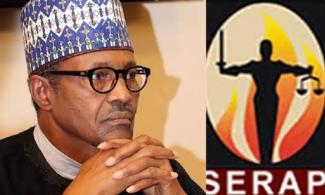
The Socio-Economic Rights and Accountability Project (SERAP) has called on President Muhammadu Buhari to immediately implement the judgment of the ECOWAS Court that prohibits the prosecution of anyone on the grounds of cyber-stalking.
The Economic Community of West African States (ECOWAS) court, a regional court based in Abuja, Nigeria's capital territory, ruled in July 2020 that Cybercrime Act violates citizens’ right of expression and ordered the Nigerian Government to repeal or amend the provisions of the Act.
Delivering the judgment of the three-man panel of the court, Justice Januaria Costa ordered the Nigerian government to make the law align with its obligation under Article 1 of the African Charter on Human and Peoples’ Rights and the International Covenant on Civil and Political Rights.
A summary of the judgment released by the court’s media unit stated that the verdict “held the Nigerian government liable for the violation of the right to freedom of expression” with the enactment of section 24 of the Cybercrime Act, 2015.
The said section 24 of the law, criminalises sending from computer messages considered to be among others, “grossly offensive, pornographic or of an indecent, obscene or menacing character or causes any such message or matter to be so sent”, or that the person “knows to be false, for the purpose of causing annoyance, inconvenience danger, obstruction, insult, injury, criminal intimidation, enmity, hatred, ill will or needless anxiety to another or causes such a message to be sent”.
A civil society group, Laws and Rights Awareness Initiative, had through its counsel Mr Chukwudi Ajaegbo, filed a suit marked application ECW/CCJ/APP/53/18 on November 6, 2018, claiming among others, that its members’ freedom of expression on the internet or in the use of computer devices was limited/breached by Section 24 of the Cybercrime Act enacted by the Nigerian government.
The plaintiff further claimed that nine of its partners were arrested and detained in connection with the enforcement of the provision of Section 24 of the Cybercrime Act in violation of Articles 9 of the African Charter on Human and Peoples’ Rights, 19 of the International Covenant on Civil and Political Rights, and 39 of Nigeria’s Constitution.
Also, the ECOWAS Court in a suit brought by SERAP, ruled that Section 24 of Nigeria's Cybercrime Act is vague, arbitrary, and unlawful. It insisted that "it is contrary to the rule of law for the police to charge anyone with supposed 'cyberstalking.'"
However, in a statement on Sunday, SERAP appealed to President Buhari to "enforce and implement the judgment by compelling government institutions to respect, protect and promote freedom of expression, access to information and media freedom."
In the statement signed by SERAP Deputy Director, Kolawole Oluwadare, the organisation expressed concerns about the shrinking civic space in the country, stating that some state governors and government institutions are reportedly using Section 24 of the Cybercrime Act and other repressive laws to crack down on anyone seeking to assert their human rights, and media freedom.
The group warned that if the judgment was not implemented, it would be left with no other choice but to consider seeking a Writ of Execution from the ECOWAS Court, and asking the ECOWAS Authority of Heads of State and Government to impose sanctions on the country's government for non-compliance with these judgments.
SERAP said, "Many Nigerians and media houses continue to face threats simply for speaking out and seeking to peacefully exercise their human rights and carry out their professional duties. This situation is contrary to the Nigerian Constitution 1999 (as amended) and the judgments by the ECOWAS Court.
"The immediate enforcement and implementation of the judgments by your government will be a victory for the rule of law, the right to freedom of expression and media freedom, including online."
It added, "These disturbing trends show the failure by your government to effectively comply with the country's international obligations and the ECOWAS Court judgments on the Cybercrime Act and Twitter ban.
"If the two judgments are not immediately enforced and implemented, SERAP will consider seeking a Writ of Execution from the ECOWAS Court, and asking the ECOWAS Authority of Heads of State and Government to impose sanctions on your government for non-compliance with these judgments.
"By implementing the judgment, your government will be demonstrating Nigeria's leadership within the ECOWAS sub-region, and sending a powerful message to other countries to embrace the rule of law and human rights.
"The processes for the sanctions are provided for under the 2015 Supplementary Protocol, the 2012 Supplementary Act on Sanctions and the 1993 ECOWAS Revised Treaties. The sanctions may include judicial, economic and political sanctions.
"Section 27 of the Vienna Convention on the Law of Treaties provides that, 'A State party to a treaty may not invoke the provisions of its internal law as justification for its failure to perform the treaty.'
"SERAP also urges you to direct Mr Abubakar Malami, SAN the Attorney General of the Federation and Minister of Justice to withdraw all charges of 'insulting or stalking public officials online' against activists, critics and journalists, ensure their release from unlawful detention, and pay adequate compensation to those who have faced unfair prosecutions on the basis of the unlawful provisions.
"SERAP urges you to instruct Mr Lai Mohammed, Minister of Information and Culture and the National Broadcasting Commission (NBC) to immediately reverse the arbitrary and unlawful fine of N5 million imposed on Channels TV for allegedly violating the NBC code in a programme with the Labour Party vice-presidential candidate, Datti Baba-Ahmed."